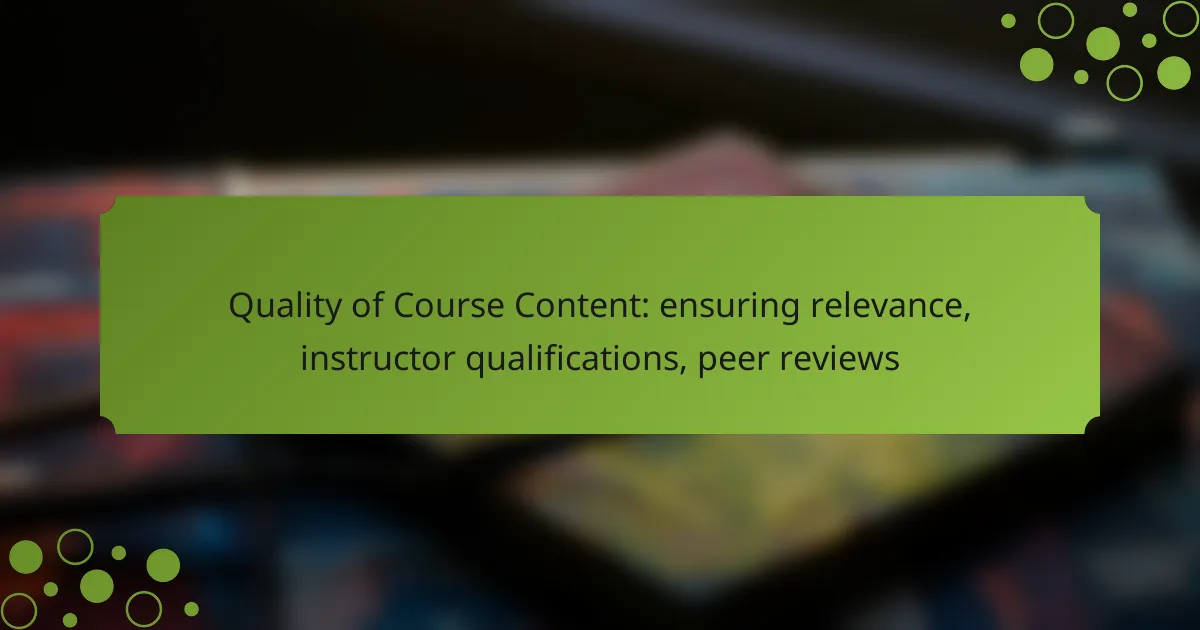
Ensuring the quality of course content is essential for effective learning, as it involves aligning materials with industry standards and real-world applications. Instructors with advanced qualifications and relevant experience are crucial for delivering insightful and applicable knowledge. Additionally, thorough evaluation of peer reviews can provide valuable insights into the course’s credibility and relevance.

How to ensure course content relevance?
Ensuring course content relevance involves aligning educational materials with current industry standards, trends, and real-world applications. This approach enhances the learning experience and prepares students for practical challenges in their fields.
Align with industry standards
To maintain relevance, course content should reflect the latest industry standards and practices. This can be achieved by consulting recognized frameworks and guidelines specific to the field, such as ISO standards for technical courses or accreditation requirements for professional certifications.
Incorporating these standards ensures that learners acquire skills and knowledge that are valued by employers. Regularly reviewing and adapting the curriculum based on industry feedback is crucial for staying up-to-date.
Utilize current trends
Staying informed about current trends in the relevant industry is essential for course content relevance. This includes understanding emerging technologies, shifts in consumer behavior, and new methodologies that are gaining traction.
For instance, in the tech sector, integrating topics like artificial intelligence or data analytics can significantly enhance the course’s appeal. Regularly engaging with industry publications and attending conferences can help educators identify and incorporate these trends effectively.
Incorporate real-world applications
Real-world applications of course content help students connect theoretical knowledge with practical scenarios. Case studies, simulations, and project-based learning can illustrate how concepts are applied in professional settings.
For example, a marketing course might include a project where students develop a campaign for a local business. This hands-on approach not only reinforces learning but also builds valuable experience that students can showcase to potential employers.
Engage with subject matter experts
Collaborating with subject matter experts (SMEs) can significantly enhance the quality and relevance of course content. SMEs bring current insights and practical knowledge that can inform curriculum development and instructional strategies.
Inviting guest speakers, conducting interviews, or even involving SMEs in course design can ensure that the content remains aligned with industry expectations. This engagement also provides students with networking opportunities and insights into career paths.
Regularly update materials
Course materials should be regularly updated to reflect changes in the industry and advancements in knowledge. This includes revising textbooks, adding new resources, and removing outdated information.
Establishing a review schedule, such as annually or biannually, can help ensure that the course remains relevant. Additionally, soliciting feedback from students and alumni can provide valuable insights into areas needing improvement or updates.

What qualifications should instructors have?
Instructors should possess a combination of advanced degrees, professional certifications, teaching experience, and industry experience to ensure they can effectively deliver relevant course content. These qualifications help guarantee that instructors are knowledgeable and capable of providing valuable insights to students.
Advanced degrees in subject area
Instructors with advanced degrees, such as a master’s or doctorate, typically have a deeper understanding of their subject matter. This level of education often indicates a commitment to research and a thorough grasp of complex concepts, which can enhance the learning experience for students.
When evaluating instructors, consider their academic credentials in relation to the course content. For instance, a master’s degree in computer science is preferable for teaching advanced programming courses, while a doctorate may be essential for specialized topics like artificial intelligence.
Professional certifications
Professional certifications demonstrate that an instructor has met industry standards and possesses specific skills relevant to their field. These credentials can vary widely depending on the subject area, such as Certified Public Accountant (CPA) for finance or Project Management Professional (PMP) for project management.
Look for instructors who hold certifications from recognized organizations, as these can indicate a commitment to ongoing professional development and adherence to industry best practices. This can be particularly important in fast-evolving fields like technology and healthcare.
Teaching experience
Teaching experience is crucial for instructors, as it equips them with the skills to effectively communicate complex ideas and engage students. Experienced instructors are often better at adapting their teaching methods to accommodate different learning styles.
Consider the number of years an instructor has spent teaching and the variety of courses they have taught. Instructors with a diverse teaching background may be more adept at handling various classroom dynamics and fostering a positive learning environment.
Industry experience
Industry experience provides instructors with practical insights that can enrich the learning experience. Instructors who have worked in their field can share real-world examples and case studies, making the course content more relevant and applicable.
When assessing an instructor’s qualifications, inquire about their professional background and any notable achievements in their industry. This experience can be particularly valuable in fields like business, engineering, and healthcare, where practical knowledge is essential for student success.

How to evaluate peer reviews effectively?
To evaluate peer reviews effectively, focus on identifying patterns, verifying enrollment, assessing the volume of reviews, and looking for detailed feedback. These factors will help you gauge the credibility and relevance of the course content.
Analyze review patterns
Start by examining the overall sentiment of the reviews. Look for consistent themes, such as praise for the instructor’s teaching style or criticism of course materials. Patterns can indicate whether the course meets expectations or has recurring issues.
Consider the distribution of ratings as well. A course with a majority of high ratings but a few low ones may still be worth considering, especially if the negative reviews address specific concerns that may not affect all learners.
Check for verified enrollment
Verify that the reviews come from individuals who have actually enrolled in the course. Many platforms indicate whether a reviewer is a verified student, which adds credibility to their feedback. This distinction helps ensure that opinions are based on genuine experiences.
Be cautious of reviews from unverified users, as they may not reflect the course’s true quality. Prioritize feedback from those who have completed the course to get a clearer picture of its effectiveness.
Consider review volume
The number of reviews can significantly impact their reliability. A course with hundreds of reviews is likely to provide a more balanced perspective than one with only a handful. Aim for courses that have at least several dozen reviews to ensure a diverse range of opinions.
However, don’t overlook quality over quantity. A small number of highly detailed and insightful reviews can be more informative than a large volume of vague comments. Look for a balance between the two.
Look for detailed feedback
Detailed feedback is crucial for understanding the strengths and weaknesses of a course. Reviews that provide specific examples of what worked well or what didn’t can offer valuable insights. Look for comments that discuss course structure, content relevance, and instructor engagement.
Avoid reviews that are overly general or lack substance, as they may not provide actionable information. Focus on those that elaborate on the learning experience, as these can help you make a more informed decision about the course’s suitability for your needs.

What frameworks can guide course selection?
Several frameworks can effectively guide course selection, focusing on accreditation, learning outcomes, and peer reviews. These frameworks help ensure that the course content is relevant, the instructors are qualified, and the experiences of past students are considered.
Course accreditation standards
Course accreditation standards are essential benchmarks that validate the quality and credibility of educational programs. Accreditation bodies evaluate courses based on established criteria, which may include curriculum relevance, instructor qualifications, and institutional resources.
When selecting a course, look for programs accredited by recognized organizations relevant to your field. For example, in the United States, the Accreditation Board for Engineering and Technology (ABET) is crucial for engineering programs, while the Association to Advance Collegiate Schools of Business (AACSB) is significant for business courses.
Learning outcome assessments
Learning outcome assessments measure the effectiveness of a course in achieving its educational goals. These assessments can take various forms, such as exams, projects, or practical applications, and they provide insight into how well students are grasping the material.
When evaluating a course, consider how learning outcomes are assessed and whether they align with your personal or professional goals. Look for courses that offer clear, measurable outcomes and regular feedback mechanisms, ensuring that you can track your progress effectively.


